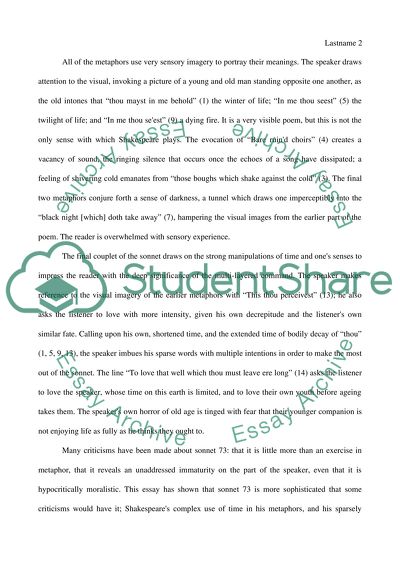
An Analysis of Shakespeare's Sonnet 73 Sonnet 73 by William Shakespeare is widely read and studied. But what is Shakespeare trying to say? Though it seems there will not be a simple answer, for a better understanding of Shakespeare's Sonnet 73, this essay offers an explication of the sonnet from The Norton Anthology of English Literature: That time of year thou mayst in William Shakespeares Sonnet 73 Essay. William Shakespeare’s Sonnet 73That time of year thou mayst in me beholdWhen yellow leaves, or none, or few, do hangUpon those boughs which shake against the cold,Bare ruin’d choirs, where late the sweet birds sang. In me thou see’st the twilight of such dayAs after sunset fadeth in the west,Which by Estimated Reading Time: 7 mins · This essay on William Shakespeare’s “Sonnet 73” Literature Analysis was written and submitted by your fellow student. You are free to use it for research and reference purposes in order to write your own paper; however, you must cite it accordingly. “Educating Rita” by Willy Russell Literature Analysis Essay. Virginia Woolf’s Novel Mrs. Dalloway Essay “The Buddha
Shakespeare's Sonnet #73 Essay - Words | Bartleby
In this poem, the speaker invokes a series of metaphors to characterize the nature of what he perceives to be his old age, sonnet 73 essay. In the couplet, the speaker tells the young man that he must perceive these things, and that his love must be strengthened by the knowledge that he will soon be parted from the speaker when the speaker, like the fire, is extinguished by time, sonnet 73 essay.
But in each of these quatrains, with each of these metaphors, the speaker fails to confront the full scope of his problem: both the metaphor of winter and the metaphor of twilight imply cycles, and impose cyclical motions upon the objects of their metaphors, whereas old age is final.
Winter follows spring, but spring will follow winter just as surely; and after the twilight fades, sonnet 73 essay, dawn will come again. In human life, however, the fading of warmth and light is not cyclical; youth will not come again for the speaker. In the third quatrain, he must resign himself to this fact.
In this sense, Sonnet 73 is more complex than it is often considered supposed by critics and scholars. It is often argued that 73 and sonnets like it are simply exercises in metaphor—that they propose a number of different metaphors for the same thing, and the metaphors essentially mean the same thing. But to make this argument is to miss the psychological narrative contained within the choice of metaphors themselves. Sonnet 73 is not simply a procession of interchangeable metaphors; it is the story of the speaker slowly coming to grips with the real finality of his age and his impermanence in time.
It is important to note that the couplet could not have been spoken after the first two quatrains alone. No one loves twilight because it will soon be night; instead they sonnet 73 essay forward to morning.
Search all of SparkNotes Search Suggestions Use up and down arrows to review and enter to select. No Fear Literature Translations Literature Study Sonnet 73 essay Glossary of Literary Terms How to Write Literary Analysis. Biography Biology Chemistry Computer Science Drama Economics Film Sonnet 73 essay History Math Philosophy Physics Poetry Psychology Short Stories Sociology US Government and Politics, sonnet 73 essay. SparkTeach Teacher's Handbook.
Summary Summary and Analysis Sonnet 1 Sonnet 73 essay 18 Sonnet 60 Sonnet 73 Sonnet 94 Sonnet 97 Sonnet Sonnet Sonnet Sonnet Full Book Full Book Summary. Themes Motifs Symbols. Suggested Essay Topics, sonnet 73 essay. Summary Sonnet This thou perceivest, which makes thy love more strong, To love that well which thou must leave ere long.
Summary: Sonnet 73 In this poem, the speaker invokes a series of metaphors to characterize the nature of what he perceives to be his old age.
Previous section Sonnet 60 Next section Sonnet Read a translation Read a translation of Sonnet Take a study break Every Shakespeare Play Summed Up in a Quote from The Office. Take a Study Break.
Sonnet 73 by William Shakespeare.
, time: 13:15Sonnet 73 Analysis Essay - Words | Bartleby

William Shakespeares Sonnet 73 Essay. William Shakespeare’s Sonnet 73That time of year thou mayst in me beholdWhen yellow leaves, or none, or few, do hangUpon those boughs which shake against the cold,Bare ruin’d choirs, where late the sweet birds sang. In me thou see’st the twilight of such dayAs after sunset fadeth in the west,Which by Estimated Reading Time: 7 mins · This essay on William Shakespeare’s “Sonnet 73” Literature Analysis was written and submitted by your fellow student. You are free to use it for research and reference purposes in order to write your own paper; however, you must cite it accordingly. “Educating Rita” by Willy Russell Literature Analysis Essay. Virginia Woolf’s Novel Mrs. Dalloway Essay “The Buddha Sonnet 73 Analysis Essay. Words2 Pages. In "Sonnet 73", the speaker uses a series of metaphors to characterize what he perceives to be the nature of his old age. This poem is not simply a procession of interchangeable metaphors; it is the story of the speaker slowly coming to grips with the finality of his age and his impermanence in time
No comments:
Post a Comment